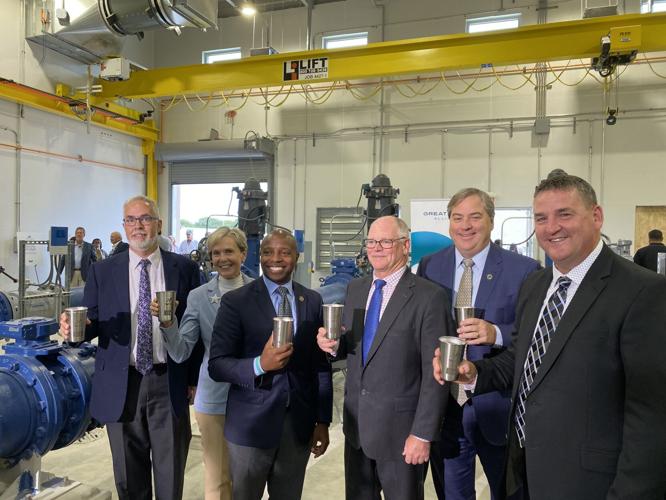WAUKESHA â On Thursday, Waukesha and Milwaukee officials came together to celebrate the completion of the infrastructure construction for Waukeshaâs transition to Lake Michigan water. At the booster pumping station, 2010 East Broadway, ceremony attendees got to sample a glass of the new water.
Waukesha Water Utility General Manager Dan Duchniak, who has been with the utility for nearly 21 years, is glad to be bringing a new water supply to Waukesha. "Iâm especially proud to say that we (have created this) generational solution on time and within our budget," he said.
Duchniak also noted how Waukesha Mayor Shawn Reilly has played an instrumental role in the transition. "He stood beside me and fought for the water supply solution the city was looking for," Duchniak explained.
At the ceremony, Reilly remarked that the water project, which required three years of construction, is the biggest public works project in Waukeshaâs history. Now, the city is just about ready to transition away from groundwater.
The project has spanned more than 20 years, beginning with Mayor Carol Lombardi. Waukesha was not in compliance with federal standards for the naturally-occurring radium in the groundwater. So from 2000-2010, studies were conducted to help find a solution.
Once the Lake Michigan solution was decided upon, the years 2010 to 2016 were spent applying for and receiving approval for the project. In order to move forward, governors of the Great Lakes states needed to sign off, along with a couple officials in our neighbor to the north.
"The Great Lakes Compact required that the application be unanimously approved by all eight Great Lakes (governments), including the premiers of two Canadian provinces," Reilly said.
To convince all the government officials to sign off, Reilly and Duchniak hopped in a car and traveled throughout the region to plead Waukeshaâs case.
"Dan Duchniak and I drove around the Great Lakes to explain our problem. This road trip was a key component in obtaining approval," Reilly noted.
The project was named the "Great Water Alliance" to honor the many individuals and entities that had a hand in bringing Lake Michigan water to Waukesha. Reilly believes that this collaboration demonstrates how many groups with various interests can work together.
"I believe the creation and adoption of the compact âĶand the consideration and determination of Waukeshaâs application has shown the entire Great Lakes region and the rest of the world that we can and should develop far-reaching agreements that protect regions and resources," he said.
Milwaukee Mayor Cavalier Johnson agreed with that sentiment. "So much can be accomplished in the spirit of cooperation, in the spirit of collaboration," he said at the event.
Waukesha County Executive Paul Farrow noted how the project is monumental and said it exemplifies what southeastern Wisconsinites are all about.
"When we know thereâs a challenge we have to overcome, we bear down and figure out how to do it," he said. "There are so many [people] that have been touched by this. âĶ What we are seeing today is really historic."
Waukesha Water Utility Commission President Joe Piatt, who has been part of the commission since 2010, reflected on the long process. He noted that after Duchniak and Reilly got the project approved, the city went through four years of permitting from 2016 to 2020 and three years of construction from 2020 to 2023. Now, Waukesha is ready to receive Lake Michigan water that, compared to its alternatives, is cost-effective, easy on the environment, and will be around for years to come.
âThis closed-loop Lake Michigan water supply system has proved to be the most affordable, most reliable for the long-term, and the most environmentally sustainable,â Piatt said.
Waukesha County Business Alliance President/CEO Suzanne Kelley also spoke during the event, explaining how the alliance has backed the project for years and is excited to usher in a new era of Waukesha water.
âThis project has been a (priority) for us and our business community for well over a decade,â she said. âHaving a healthy, sustainable source of water is a huge win for anyone who lives in the city of Waukesha.â
But Lake Michigan water wonât be flowing to Waukesha homes and businesses just yet. Waukesha Water Utility is in the process of working the water through all of its systems. The taps will be turned on between Sept. 14 and 18.
Once the taps are turned on, it will take five days for 90 percent of the city to transition over to Lake Michigan water. It will take three to four weeks for the last 10 percent to receive the water â this includes dead ends and cul-de-sacs, which have systems that need to be flushed out individually.
Duchniak is looking forward to all the residents in of Waukesha having this brand new H2O.
âIn a week or so we will turn (the taps) on, and that water will be safe, reliable drinking water from Lake Michigan, flowing to our customers for generations to come,â he said.
For more information about the transition to Lake Michigan water, visit .











